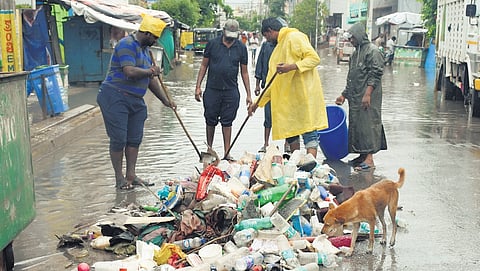

VIJAYAWADA: While torrential rains, water hyacinths, and encroachments on water bodies and canals contributed to the crisis, the unchecked accumulation of plastic waste in the city’s drainage systems emerged as a major culprit, blocking water flow in 32 wards of the city.
Sanitation workers clearing floodwaters reported that plastic waste, along with bottles, discarded mattresses, and wood debris, clogged the city’s drains and prevented floodwater from receding.
“Obstructing the flow of water, plastic was everywhere in the drainage system. If it weren’t for this accumulation, the flooding might not have been so severe,” said Daniel, a sanitation worker clearing a blocked canal in Prasanthi Nagar.
The drainage system, already burdened by urban encroachments and the unremoved water hyacinths in Budameru from Velagaleru to Hamsala Devi, could not handle the added load of plastic waste.
Shanmukha Priya Kasilinka, a sustainability advocate, told TNIE, “Plastic waste, especially bottles, significantly worsened the flood’s effects. It’s urgent that we rethink our habits and take responsibility. Reducing plastic use and improving waste management can prevent such disasters.”
NGOs are calling for immediate government action to clean up the flood-affected areas and prioritise long-term solutions to combat plastic pollution.
Prof. Ajay Katragadda, Founder of the AWARA Foundation, told TNIE that the once pristine canals of the Krishna River have become sewage channels with high BOD (Biochemical Oxygen Demand), as urban sewage flows directly into them while authorities remain passive.
He said public dumping, including a mix of human waste, organic silt, silage, stormwater, and non-degradable litter, is washed into these waterways from high-profile areas. The situation has worsened since 2020, with disposable culture and material-heavy lifestyles further clogging these waterways.
These floods serve as a stark reminder that plastic waste is not just an environmental issue but also a public safety hazard. Action from both the government and the public is necessary to prevent a recurrence of this disaster, said A Madhavi, a social activist.